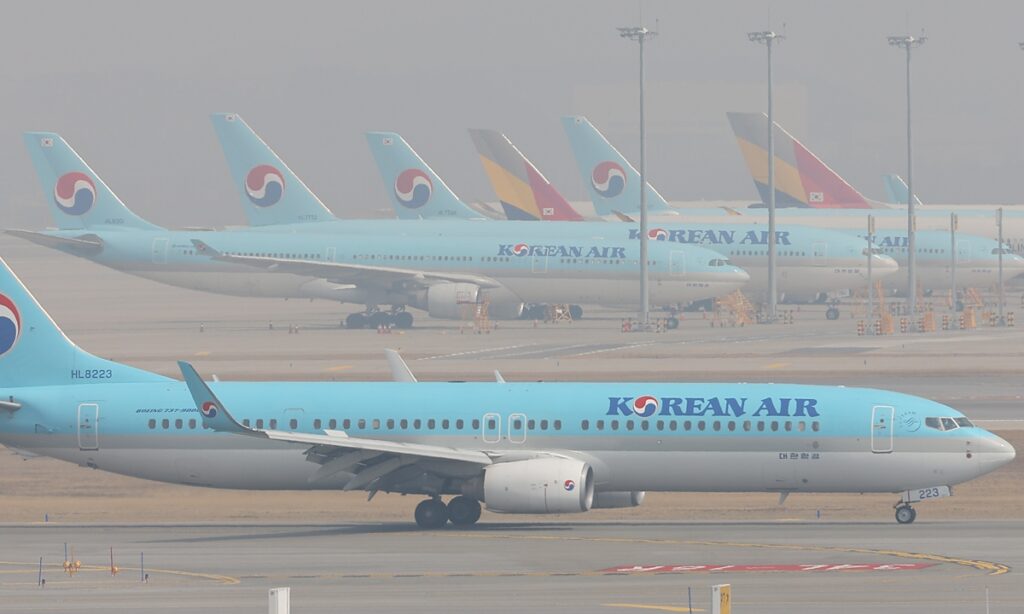South Korean airlines including the country’s largest flag carrier Korean Air, have reportedly announced that they will suspend flight routes to destinations in China, with Korean media citing a significant drop in demand amid strained relations between China and South Korea as reasons.
Chinese observers believe the adjustments are due to market factors, which reflect that South Korean airlines have low confidence that there will be any notable increase in terms of passenger loads in the short term, since the incumbent administration of President Yoon Suk-yeol has yet to display the resolution and will to improve ties with China.
According to the Korea JoongAng Daily, the number of passengers flying from South Korea to China from April to May totaled 402,410, a drop of 73.7 percent compared to the corresponding period in 2019, before the outbreak of the COVID-19 pandemic.
Against this backdrop, Korean Air said it would suspend its daily flights between the Gimbo International Airport (GMP) in Seoul and Beijing starting from August until October 28, flights between the GMP and the Gaoqi International Airport in Xiamen, East China’s Fujian Province from August 8 to October 28, South Korea’s Yonhap News Agency reported.
An insider with the Korean Air confirmed the above-mentioned suspended flights, and explained to the Global Times that the suspension is due to lack of passenger demand and the low load factor of the routes.
Similarly, Asiana Airlines, South Korea’s second-largest carrier, said it would suspend daily route from GMP to airports in Beijing starting from July 6, after having already halted a route between Incheon and Xi’an, capital of Northwest China’s Shaanxi Province since June 20. It will also suspend a route from Incheon to Shenzhen, South China’s Guangdong Province, starting on July 8. All flights will resume on October 28, Yonhap report said.
Data from industry information provider VariFlight sent to the Global Times shows there were 3,471 flights between the Chinese mainland and South Korea from June 1 to 21, of which 60 percent were provided by Chinese airlines. The top three airlines are China Eastern Airlines, Korean Air and Asiana Airlines.
Before bilateral ties took a significant hit in 2017 when South Korea installed the US Terminal High Altitude Area Defense (THAAD) anti-missile defense system, Chinese travelers made more than 8.26 million trips to South Korea, accounting for 47.5 percent of South Korea’s total of foreign visitors in 2016. According to South Korean official data, there were than 1,200 flights a week between the two countries.
It is reasonable for South Korean airlines to suspend flight routes to China in order to lower costs and seek higher income given that the passenger loads have plunged, Dong Xiangrong, a senior fellow at the National Institute of International Strategy at the Chinese Academy of Social Sciences, told the Global Times on Sunday.
There are surely political factors behind the low passenger volume, Dong said, citing South Korean president Yoon’s recent inappropriate remarks on the Taiwan question for instance.
Yoon’s conservative government has been implementing a foreign policy that is very much tilted toward pro-US and pro-Japan routes and that has brought about obvious side effects, arousing domestic concerns over souring ties with China and Russia, as well as tensions on the Korean Peninsula, Dong said.
At present, the conservative South Korean government has not yet shown the will, determination and action to restore China-South Korea relations. Instead, it is recklessly emphasizing that the issue concerning the deployment of the THAAD anti-missile defense system is an issue of South Korean sovereignty, and it is using “value diplomacy” as a slogan to accelerate the division of camps in the international community. North Korea-South Korea relations on the peninsula have adopted a confrontational posture of “strong against strong,” which, as a result, means political relations between China and South Korea have shown no signs of easing for the time being, Dong said.
South Korea has become a less attractive destination for Chinese tourists and South Korean products are less popular among Chinese tourists too, therefore it is hard to see Chinese travelers crowding in duty free shops and tourist spots in South Korea once more, according to Dong who has been following China-South Korean ties for a very long time.
South Korea’s discriminatory travel restrictions targeting travelers from China earlier this year as China exited its zero-COVID policy may also have hurt the feelings of Chinese tourists, causing the decline, according to observers.
According to Reuters report on South Korean exports, the country’s shipments to China slid 20.8 percent in May, marking the 12th straight annual loss.
Observers point out that such a drop in trade would lead to a significant decline in terms of the communication needs for businesspeople from both sides.
The current difficulties and challenges in China-South Korea relations were not caused by China, Chinese Foreign Ministry spokesperson Wang Wenbin said in early June, while urging South Korea to adhere to the one-China principle and handle Taiwan-related issues in a prudent way.
(Global Times)



